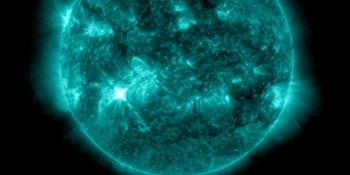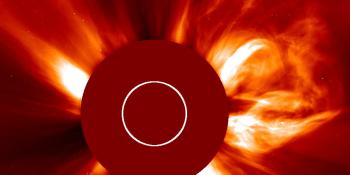Visualizzazione archivio di mercoledì, 14 agosto AM
Rapporto attività solare
Ogni brillamento solare menzionato nel rapporto ha un fattore di scala, applicato dal Centro di Predizione Meteorologica Spaziale (SWPC). A causa del fattore di scala del SWPC, i brillamenti solari sono segnalati come ridotti del 42%, rispetto ai dati di qualità scientifica. Il fattore di scala è stato rimosso dai nostri dati archiviati sui brillamenti solari, per riflettere le unità fisiche reali.
Rapporto dell'Attività Geofisica Solare 2002 Aug 14 2200 UTCPreparati dal SWPC della NOAA© ed elaborati da SpaceWeatherLive.com
Rapporto Congiunto USAF/NOAA dell'Attività Solare e Geofisica
SDF Numero 226 Emesso alle 2200Z il Aug 14 2002IA. Analisi delle Regioni Solari Attive e Attività dalle 2100Z-13 alle 2100Z-14 Solar activity remained at moderate levels. Region 61
(N08W69) produced a long-duration M2/1n flare at 14/0212 UTC
associated with a Type II radio sweep, partial-halo CME, and a solar
proton event. Region 61 had been in a state of gradual decay for the
last several days. Region 67 (N11E20) produced an M1/1f flare at
14/1815 UTC as well as a few C-class flares. It was in a growth
phase during the period. Region 69 (S08E37) produced isolated
C-class flares as it continued to gradually increase in area, which
now exceeds 1500 millionths of the solar disk. Region 66 (N13E03)
produced isolated C-class flares as it grew at a gradual pace. New
Regions 78 (S13W12), 79 (S20E55), and 80 (N16E69) were numbered
today.
IB. Previsione dell'Attività Solare
Solar activity is expected to be at
low to moderate levels. Isolated M-class flares are possible through
the period. There is a slight chance for a major flare from Region
69.
IIA. Sommario dell'Attività Geofisica dalle 2100Z-13 alle 2100Z-14
Geomagnetic field activity was at quiet to unsettled levels during
most of the period, with brief active periods detected at high
latitudes. A greater than 10 MeV proton event began at
geo-synchronous orbit at 14/0900 UTC and reached a preliminary
maximum of 26 pfu at 14/1620 UTC. The greater than 2 MeV electron
flux at geo-synchronous orbit increased to moderate to high levels
during the period.
IIB. Previsione dell'Attività Geofisica
A geomagnetic disturbance is
expected to begin during the latter half of 15 August and continue
into 16 August following today's long-duration M2/partail-halo CME
event. Active to minor storm conditions are expected during this
disturbance. Field activity is expected to decrease to quiet to
unsettled levels on 17 August. The greater than 10 MeV proton event
is expected to end sometime during the first half of the forecast
period. The greater than 2 MeV electron flux is expected to be at
moderate to high levels during the period.
III. Probabilità dell'Evento dalle Aug del 15 alle Aug del 17
| Classe M | 45% | 45% | 45% |
| Classe X | 05% | 05% | 05% |
| Protone | 90% | 75% | 40% |
| PCAF | yellow | ||
IV. Flusso di 10.7 cm di Penticton
Osservato 14 Aug 208 Previsto 15 Aug-17 Aug 210/215/215 Media di 90 Giorni 14 Aug 165
V. Indici Geomagnetici A
Osservato Afr/Ap 13 Aug 009/013 Stimato Afr/Ap 14 Aug 012/015 Previsto Afr/Ap 15 Aug-17 Aug 015/020-025/030-012/015
VI. Probabilità dell'Attività Geomagnetica dal 15 Aug al 17 Aug
| A. Latitudini Medie | |||
|---|---|---|---|
| Attivo | 40% | 35% | 25% |
| Tempesta minore | 20% | 30% | 10% |
| Tempesta maggiore-grave | 05% | 10% | 01% |
| B. Latitudini Alte | |||
|---|---|---|---|
| Attivo | 45% | 30% | 30% |
| Tempesta minore | 25% | 35% | 15% |
| Tempesta maggiore-grave | 10% | 20% | 01% |
Tutti gli orari in UTC
<< Vai alla pagina della panoramica giornaliera
Ultime notizie
Ultimi messaggi dal forum
Coronal mass ejection impact and G4 geomagnetic storm 10 & 11 October 2024 934AR 3938 21AR 13933 9AR 13932 89AR13936 6
Altri argomentiSupporta SpaceWeatherLive.com!
Molte persone vengono su SpaceWeatherLive per seguire l'attività del Sole o sapere se ci sia la possibilità di vedere l'aurora, ma a maggior traffico corrispondono costi maggiori. Considerate una donazione se vi piace SpaceWeatherLive così che possiamo mantenere online il sito web!

Notizie sul meteo spaziale
| Ultimo brillamento X | 2024/12/08 | X2.2 |
| Ultimo brillamento M | 2024/12/26 | M7.3 |
| Ultima tempesta geomagnetica | 2024/12/17 | Kp5+ (G1) |
| Giorni senza macchie | |
|---|---|
| Ultimo giorno senza macchie | 2022/06/08 |
| Media mensile Numero di Macchie Solari | |
|---|---|
| novembre 2024 | 152.5 -13.9 |
| dicembre 2024 | 119.3 -33.2 |
| Last 30 days | 122 -35.7 |


